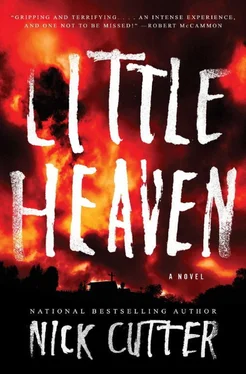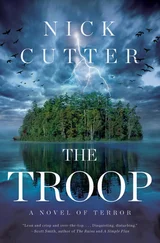“We got to find them, Shug. Or try, at least.”
“The children?”
“Yeah, Shug. The children.”
Micah said, “We have not heard the last of the Reverend.”
“What do you think he’s up to?”
“Something,” said Micah. “He will commune with God, or so he will tell his flock. Then he will make his move.”
Minerva looked at him, sucked at her teeth, then glanced away. “It’s still weird.”
“What is?”
“You. With two eyes.”
“One is glass.”
“Really? The old one didn’t grow back?” She frowned. “Sorry. I’m ill at ease.”
Minerva hooked her fingers through the fence. The sun fought through a bank of clouds and shone down on the woods. They appeared empty; the things could be clustered closer to the road, disregarding the northern flank of Little Heaven. The massive rock formation loomed over the trees. Her fingers tightened.
“I think we’re gonna die here, Shug.”
Micah didn’t reply. She hadn’t expected him to. She closed her eyes. She saw the children clustered together under the kitchen trapdoor, their faces white as gaslight. She opened her eyes again, not wanting to see them anymore. “Any clue where they went?”
Micah angled his chin at the black rock that rose at a blunt angle against the sky.
The two of them walked back to their bunkhouse. The grounds were unoccupied; everyone was inside, out of sight. Ellen and Nate were inside. Nate’s father was not. Minerva grabbed her backpack. She checked the loads on Ellen’s pistol.
“Where are you going?” said Ellen.
“To find the kids,” said Micah, arranging his own pack for travel.
“What about those things?” Ellen said.
“We’re going north, toward the rock formation,” Minerva told her. “They don’t seem to be gathered out that way.”
“But what if they are?”
Minerva gave her a grisly smile. “It’ll be a short trip.”
“Why?” said Nate. “I mean, I saw those kids. I don’t think… they may not come with you. It won’t let them.”
“What do you mean, it won’t let them?” Minerva asked.
“That’s what Eli said when he came up through the door,” the boy told her. “ It wants you , he said. It wants all of you. ”
A chill fled down Minerva’s spine. “If we don’t know what we’re up against, we stand a much worse chance of surviving.”
“But don’t you think Ebenezer will send for—”
“I have no fucking idea,” said Minerva, cutting Ellen off. “I don’t trust that shithead any farther than I can throw him. Sorry for cursing, kid.”
“I want to go,” Ellen said.
Micah shook his head. “Someone needs to stay. Keep an eye.”
“Why me?” said Ellen, pissed.
Nate clutched her hand. “Please don’t go.”
“Okay,” Ellen said after a pause. “We’ll stay.”
“We won’t be gone long,” Minerva promised.
“Just be careful,” Ellen said, looking at Micah.
THEY SET OFFin the early afternoon. Nobody saw them leave—or if so, they made no effort to stop them. What would be the use now? Micah snipped the fence at the farthest edge of Little Heaven with some bolt cutters he’d found in a supply shed. He and Minerva slid through the gap, entering the woods.
The trees were thin, with no discernable trail through them. Minerva had a pistol. Micah went unarmed. A gun felt trivial in his hand now. A useless toy.
They stumbled upon a path of sorts. A band of desolate gray stripping through the woods. Not a thing was living along it. Not a tree, a shrub, a weed. It was as if a scouring fire had burned across the ground, leaving only powdery ash behind.
The path wound toward the black rock, which Minerva could glimpse through gaps in the trees. An unsettling sight: a sheer cliff of blackness so dark it swallowed the sunlight. The woods were silent. They were not being trailed.
They kept their own counsel. Minerva could tell that Micah was exhausted. His encounter with the things that had left Otis and Charlie and the red-bearded man dead had sapped his energy. His stride was labored, but his pace was remorseless. Minerva felt weary, too. It was like living in the shadow of a dormant volcano: you never knew when it was going to erupt and spew molten lava all over you.
Clouds rolled in. Rain pattered down. A steady trickle soon grew to a sheeting downpour. They found shelter under the firs. Minerva became aware of the powerful funk of her body. How long had she gone without bathing? She thought back to her last shower in a motel bathroom a few hours’ drive from Grinder’s Switch. The yellowy water spraying from a calcified nozzle. The mildewed shower curtain with a pattern of bow-tied ducks. How much would she pay to take a shower right now? A thousand dollars? Ten thousand?
The downpour lasted fifteen minutes. The rain turned the ash into a slurry that clung to their boots. They walked until the sun began to fade.
They rounded a bend, and it came into view. The black rock.
The trees petered out, becoming more stunted and palsied. The surrounding landscape was as sandy as a desert. It was monolithic. A giant rotted tooth pushing up from the red sand. It was a mile distant, but Minerva could feel its forbidding magnetism gripping her already—she was a lead filing dragged toward its brooding shadow.
“You do not have to come,” Micah said.
“Like hell I don’t.”
YOU’RE ONE DUMB BUNNY, Virgil Swicker.
Virgil’s mother used to say that. His own mother, who was so damn smart she got knocked up eight times by five different daddies. So damn smart she couldn’t wring a shaved nickel out of any of them in child support, so she and her brood lived in a saltbox shack on the edge of the Mojave Desert, sucking on sand. A real smarty-pants, his ma!
But she had him dead to rights. Virgil was dumb. He was just smart enough to know it. Which was a pretty sad place to pin the tail on that particular donkey. If he’d been juuuuust a little dumber—if he could have killed off a few measly IQ points—he probably wouldn’t have been able to grasp how witless he was. And then it wouldn’t have bothered him so much. What a kick in the teeth, huh?
One thing about knowing your limits is you learn how to operate within them. Virgil Swicker had learned early on that his lot in life was being a follower. He felt safest behind someone else, looking down at that man’s heels. A leader needed smarts and fire and drive. All a follower ever needed to know was where to line up.
Virgil had left home at fifteen to little fanfare; his mother could barely care enough to wave good-bye from the stoop. He hitchhiked to San Francisco and lived on the streets, eating out of dumpsters behind Chinky restaurants. He was a big kid and nobody had raised him right; he started rolling drunks, and that went well for a while before this one rummy wheeled on him with a switchblade. The guy was nimble with that blade, too, even three sheets to the wind—“I’m over from Stockton, motherfucker!” he kept screaming, as if that should mean something to Virgil, as if laying your hands on a wino over from Stockton was a capital crime. That Stockton trash maniac opened a big slash under Virgil’s armpit, then chased him down the street, laughing like a schoolboy, tee-hee-hee —if the nutzoid hadn’t tripped into a gutter, he would have caught Virgil and stabbed his eyes out.
After that, Virgil mooned around the Tenderloin like a kicked dog. There were times he thought about buying a knife or maybe a gun—that bastard with the switchblade wouldn’t have been so high-and-mighty if Virgil had stuck a pistol in his face, bet your ass on that —but he couldn’t afford either of those items. It was in the depths of despair that a single ray of sunlight brightened Virgil’s world. That ray had a name: Cyril Neeps.
Читать дальше












